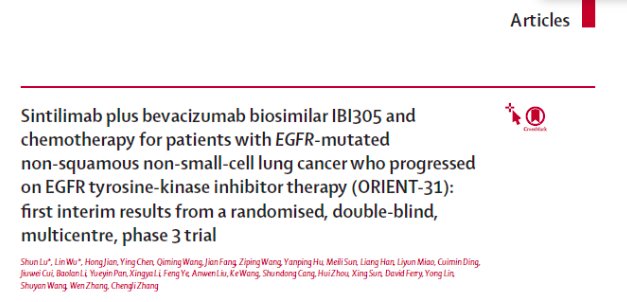
A few days ago, the national multi-center clinical study ORIENT led by Professor Lu Shun, director of the oncology department of Shanghai Chest Hospital, and participated by chief physician Jian Hong, etc. -31 has made important progress, and related results have been published in the top international medical journal “Lancet Oncology” with an impact factor of 54.43. The research results achieved a breakthrough “world first” in the field of targeted drug resistance in lung cancer. It was confirmed for the first time that immunotherapy combined with anti-angiogenesis targeted therapy can improve EGFR-targeted drug resistance in patients with non-squamous non-small cell lung cancer. To achieve a significant survival benefit, it provides a new treatment option for such patients.
With the continuous development of targeted therapy, those patients with advanced lung cancer with sensitive gene mutations have achieved longer survival. However, drug regimens for EGFR-targeted therapy resistance are scarce, and the prognosis of patients is poor, which is a difficult clinical problem that needs to be solved urgently. In particular, whether immunotherapy is beneficial to targeted drug-resistant patients has not yet been answered by the academic community.
In order to get rid of the predicament after drug resistance of targeted therapy and to explore more hope for patients, Professor Lu Shun of Chest Hospital and his team focused on the immunotherapy-based combination therapy model, and led a project. Prospective, randomized, double-blind, multicenter phase III clinical study “Sintilimab combined with bevacizumab and platinum-based doublet chemotherapy versus platinum-based doublet chemotherapy in the treatment of TKI-resistant EGFR-mutant advanced non-squamous cell carcinoma. Blind multi-center clinical study (ORIENT-31)” provides a new idea for EGFR-targeted post-resistance treatment.
A total of 444 patients with EGFR-mutant non-small cell lung cancer who progressed after targeted therapy were included in the study. The results showed that the combination of PD-1 inhibitors combined with anti-angiogenic inhibitors and chemotherapy significantly prolonged median progression-free survival (4.3 months vs 6.9 months) and reduced the risk of disease progression compared to standard chemotherapy54 %, while also providing a higher objective response rate and disease control rate, and the overall safety is controllable.
The results of this study have created a new pattern of EGFR-targeted post-resistance treatment and confirmed the great application prospects of immunocombination therapy in such non-small cell lung cancer patients
strong>, to meet the treatment needs of more patients and bring them new treatment options and hope for treatment.
Author: Tang Wenjia
Editor: Tang Wenjia
p>
Responsible editor: Fan Liping
*Wenhui’s exclusive manuscript, please indicate the source for reprinting.